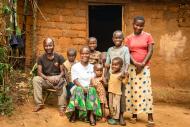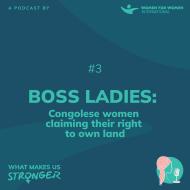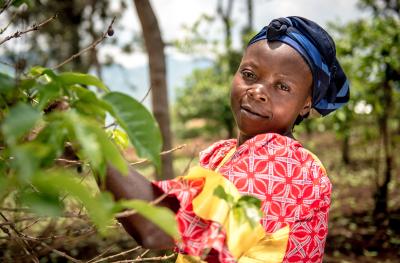
My name is Angelique Nabinto Mwana Mupopo and I live in Nyangezi in the Democratic Republic of Congo (DRC). I am proud to say I am married and the mother of five girls and four boys.
Today, I am also proud to say I am a landowner.
How can I help you understand how important that is to me? In the past, it was not easy for a woman to acquire, buy or inherit land in the DRC.
For many years I was working hard, doing farming activities in other people’s fields, but I was only making maybe the equivalent of a dollar a day, not enough for anything. Thank God, my husband, who is a mason, had a job. But we live in a place that has so much conflict and violence. Every day you feel scared that something could happen to someone you love, just by being in the wrong place at the wrong time.
Five years ago, my husband broke his leg on a construction job and couldn’t work any longer. I became frantic because now I had to be the sole support of my household. All I knew was farming. Every day I worried, how would we survive? Would we have enough to eat? How could I pay my children’s school fees?
Around that time the chief of our village was passing door to door in our community to tell people about the WfWI program. I was excited because I had never heard about it before and I immediately joined.
The things we learned in our group of 24 women really opened my eyes. Our teachers were businesswomen from the DRC who taught us so much about our rights as women, how to manage our reproductive health, how to earn and save money. I learned basketmaking as a vocation. But most important to me was the sisterhood support. We learned how to support each other and live in a peaceful community with respect.
When WfWI launched the Change Agents program in 2018, the women in my VSLA investment group chose me and I became a Change Agent. With the communication skills I learned, I was able to help a neighbor get to safety who was being beaten and threatened by her drunk husband; the next morning we all sat down together and I gave them advice. From that day on, I’ve never seen him beat her again.
I also shared all the things I learned from WfWI with my husband, but at that time he didn’t allow me to participate in any decision-making in our household.
But then the Men’s Engagement group held a couples’ dialogue session and my husband was invited. The topic was land heritage, what our laws actually say, something new for men and women. After the session, some men there started to change their mindset, but once we were home, my husband surprised me when he asked me whether giving women the right to acquire land might lead to women asking for a divorce.
I could feel what he was feeling, but I told him the aim of the session was to change the community’s mentality about land management. Later he asked me,
“Why did women not get lands previously?”
Finally, when we went to our village and I shared with our community what I had learned from WfWI, he did something that really surprised me.
In front of all the villagers, he stood up and said, “It’s true, men should set the example,” and then to me, “Angelique, I will give you land to be under your name!”
I was so amazed to hear him say that and immediately asked in my heart for God to bless him. He granted me a chunk of land he had inherited from his parents and supported the entire process of registration up to when I got the official papers, which WFWI advocated and facilitated for us.
The day I received my land title I was so excited, I wanted to jump for joy, but we were in a public ceremony!
My plan is to use my land for family purposes because life is too short, and my children can build on it or use it for agricultural purposes. The land will be for both my sons and daughters. There was a time when my husband told me that I had no say in it because he is the one who inherited the land. Now it makes me so happy to know that I must be involved if any more land is sold. WfWI has really educated me to be strong and economically self-sufficient.
It also makes me so happy to see my family growing. My greatest dream is to see my daughters one day owning their land too, just as my husband gave it to me.
Learn More About Angelique and Our Work in DRC by Listening to Our Podcast Episode 3:
Even though most farm workers in developing countries are women, very few of them own the land they work on. Some rural communities ignore the law and forcibly seize land from women or prevent them from buying or inheriting land in the first place. In this episode, Nisha hears from Angelique, a Congolese woman who tried to persuade a skeptical community that she had just as much right to own land as her husband. Nisha also talks to Rachel Boketa, the Country Director of Women for Women International in the Democratic Republic of the Congo and Sabreen Alikhan, our Director of Monitoring, Evaluation, Research and Learning about a project to support women like Angelique to become advocates for equality as well as ‘boss ladies’ in their own right.



